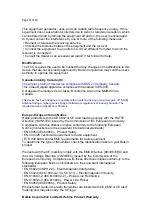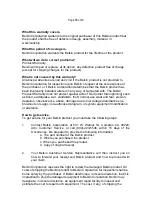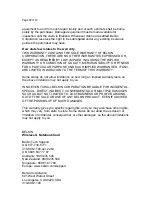
Page 33 of 40
Note:
To check the SSID settings or look for an available network, double-click
the Signal Indicator icon to bring up the “Wireless Networks” screen. Click “Add”
if you do not see the network you are trying to connect to and type in the SSID.
For more information about setting up an SSID, please reference your router
manufacturer’s user manual. If issues persist even at close range, please contact
Belkin Technical Support.
Link LED is solid but I cannot connect to the Internet.
If you have a signal but can’t get online or obtain an IP address, the problem may
be that there is a mismatch between the encryption key settings in your computer
and wireless router (or access point). Check the WEP key settings to see if they
match. The key is case-sensitive and the spelling on each computer and wireless
router (or access point) must be exactly the same in order for the Card to
connect to the router. For more information about encryption, please see
“Securing your Wi-Fi Network” on page 16 of this User Manual.
If issues persist even at close range, please contact Belkin Technical Support.
Data transfer is sometimes slow.
Wireless technology is radio-based, which means connectivity and the
throughput performance between devices decreases when the distance between
devices increases. Other factors that will cause signal degradation (metal is
generally the worst culprit) are obstructions such as walls and metal appliances.
As a result, the typical indoor range of your wireless devices will be between 100
to 200 feet. Note also that connection speed may decrease as you move farther
from the wireless router (or access point).
In order to determine if wireless issues are related to range, we suggest
temporarily moving the computer, if possible, to five to 10 feet away from the
wireless router (or access point). Please see the section titled “Placement of your
Wireless Networking Hardware for Optimal Performance” on page 2 of this User
Manual. If issues persist even at close range, please contact Belkin Technical
Support.
Signal strength is poor.
Wireless technology is radio-based, which means connectivity and the
throughput performance between devices
decreases
when the distance between
devices
increases
. Other factors that will cause signal degradation (metal is
generally the worst culprit) are obstructions such as walls and metal appliances.
As a result, the typical indoor range of your wireless devices will be between 100
to 200 feet. Note also that connection speed may decrease as you move farther
from the wireless router (or access point). In order to determine if wireless issues
are related to range, we suggest temporarily moving the computer, if possible, to
five to 10 feet away from wireless router (or access point).
Changing the wireless channel –
Depending on local wireless traffic and
interference, switching the wireless channel of your network can improve








































